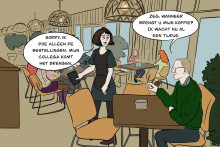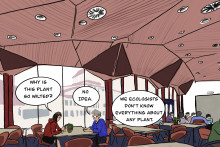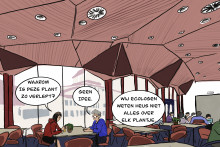The oddest question a layperson ever asked her came from a journalist. She developed a new technology to measure blood values in premature babies, using light. 'The journalist wanted to know whether I myself had had a premature child,' says Nienke Bosschaart, associate professor in Biomedical Photonic Imaging. When I answered that this was not the case, all journalistic interest disappeared.' Fortunately, other lay people usually react enthusiastically to her work. 'It is easy to explain why my research is important and almost everyone likes babies.'
Besides blood analysis, breast milk also has her scientific interest. When she attended a conference on the subject a few years ago, she was impressed by all that is already known about breastfeeding. However, she also realised that her own field of expertise had so far neglected an important subject. 'When women have problems breastfeeding, it is often because they suspect that the child is not getting enough milk. I was very surprised that hardly any techniques are used to measure what is happening inside the breast, while there is a wide range of biomedical technologies that are suitable for this.'

Bosschaart has in mind, among other things, an optical measuring method that she is already developing for blood analyses. This would make it possible to measure on the spot how much milk is leaving the breast. Why biomedical engineers did not take up this subject earlier, she does not know. But she does have a suspicion. 'Most researchers in my field are men, especially if you look higher up.’ Only one in five biomedical engineers is a woman.
Before the interview, she warns: she does not want any oversimplified statements in the article about the choice between breast and bottle feeding. She knows from experience how high emotions can run during this discussion. Is breast milk the only good start to a child's life, or just a lot of unnecessary fuss about nothing special? The truth, Bosschaart thinks, lies somewhere in the middle. 'The issue is also very polarised in health care. Mothers who experience problems with breastfeeding can call in the help of lactation consultants. Their aim is to work with the mother to make breastfeeding a success, yet bottle-feeding is sometimes a real taboo. But I think it's nice that we have an alternative.'
Bosschaart also notices how loaded the subject is when looking for research partners. For the allocation of research grants, cooperation with industry is a requirement, but not all potential partners want to cooperate with everyone. 'If I were to collaborate with an artificial nutrition brand, some lactation consultants would no longer cooperate. Fortunately, I have now found a manufacturer of breastfeeding equipment and nipple caps, because cooperation with lactation consultants is very important to me.'
One day she would like to establish a research centre for breastfeeding, where biomedical engineers work together with lactation consultants, nutritional scientists and neonatologists. 'We now have two large research applications for non-invasive measurement methods. If they are funded, we can develop truly great imaging technologies. And once we have those, of course you want to use them.'











